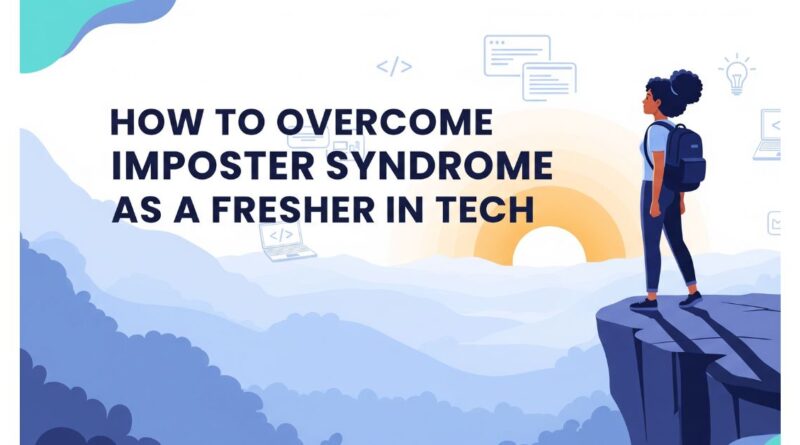🤯 How to Overcome Imposter Syndrome as a Fresher in Tech: Build Confidence, One Line of Code at a Time
🤯 How to Overcome Imposter Syndrome as a Fresher in Tech: Build Confidence, One Line of Code at a Time
Breaking into the tech world as a fresher is exciting—but also intimidating. One moment you’re celebrating a small coding win, and the next, you’re doubting your skills because someone on LinkedIn built an AI-powered app in two days. You might ask yourself: “Am I really good enough for this?”
If that sounds familiar, you’re not alone. You’re likely experiencing imposter syndrome in tech—a common psychological pattern where capable individuals doubt their skills and feel like frauds.
In this blog post, we’ll explore exactly what imposter syndrome looks like for freshers and how to overcome imposter syndrome with practical, mindset-driven strategies. Whether you’re self-taught, in college, or just landed your first job, this guide is your go-to roadmap for dealing with self-doubt in tech.
🧠 1. What is Imposter Syndrome in Tech?
Imposter syndrome is the persistent belief that you’re not as competent as others think you are, despite evidence of your abilities. It’s especially common in fast-paced, competitive fields like tech.
For freshers, this often looks like:
-
Feeling like a fraud when you get selected for an internship
-
Thinking you’re “not smart enough” to be a developer
-
Believing you got lucky rather than acknowledging your skills
Key Takeaways:
-
Imposter syndrome isn’t a sign of weakness—it’s a sign that you care.
-
Many experienced professionals also feel this way.
-
Recognizing it is the first step to overcoming it.
🌱 2. Why It’s So Common Among Freshers
The tech industry moves fast and can feel overwhelming, especially for beginners. The gap between what you know and what you think you should know creates anxiety.
Causes include:
-
Comparing yourself to others on social media or GitHub
-
Lack of real-world experience
-
Pressure to “know everything” in tech
-
Being surrounded by more experienced peers
Key Takeaways:
-
Every fresher feels uncertain at first.
-
The learning curve is steep but normal.
-
Your tech journey is your own—stop comparing chapter 1 to someone else’s chapter 10.
🔍 3. Identify Your Imposter Thoughts
You can’t fix what you don’t recognize. Pay attention to recurring thoughts that signal imposter syndrome as a beginner coder.
Common thoughts include:
-
“I’m not really a developer, I just copy-paste code.”
-
“What if people find out I’m not as good as they think?”
-
“I’ll never catch up to others in my batch.”
What to Do:
-
Write down your thoughts in a journal.
-
Label them: “Imposter Syndrome Thought.”
-
Challenge them with evidence of your progress (e.g., completed projects, problem-solving wins).
Key Takeaways:
-
Awareness breaks the cycle of self-doubt.
-
Separate facts from feelings.
-
Your thoughts are not always your reality.
🎯 4. Set Realistic Learning Goals
One reason freshers feel like imposters is trying to learn everything—all at once. This leads to burnout and increased self-doubt.
Instead:
-
Choose one learning path (e.g., Web Development or DSA)
-
Set SMART goals (e.g., “Build a personal portfolio in 30 days”)
-
Track progress weekly
Key Takeaways:
-
Learning in tech is infinite; focus on depth, not just breadth.
-
Celebrate milestones—no matter how small.
-
Structure reduces uncertainty and boosts confidence.
💬 5. Talk About It with Others
You might think you’re alone, but imposter syndrome for freshers is extremely common. The best way to break its power is by talking about it.
Who to talk to:
-
Tech mentors or senior students
-
Peer learners or study groups
-
Communities on Discord, Reddit, or LinkedIn
Key Takeaways:
-
Vulnerability leads to connection.
-
Chances are, others feel the same way.
-
You’ll gain both emotional support and career advice.
🧩 6. Track Evidence of Your Growth
Your mind can lie to you, but data doesn’t. Keep a log of your wins, however small, to remind yourself that you’re improving.
Start a “Wins” file:
-
Projects completed
-
Problems solved on LeetCode or HackerRank
-
Interview calls or positive feedback received
Tools to Use:
-
Notion
-
Google Docs
-
Trello
Key Takeaways:
-
Seeing your progress written down rewires your brain.
-
A “wins” list is your personal anti-imposter toolkit.
-
Progress > perfection.
📚 7. Learn From Failure Without Shame
Mistakes are not proof that you’re an imposter—they’re signs that you’re learning. Every expert developer has once crashed a server or pushed broken code to production.
Reframe failure as:
-
Feedback, not a flaw
-
A lesson, not a label
-
A step forward, not backward
What to Do:
-
Analyze what went wrong
-
Try again with adjustments
-
Share your failure story—it builds authenticity
Key Takeaways:
-
Growth comes from reflection, not perfection.
-
Every bug fixed is a lesson earned.
-
Dealing with self-doubt in tech means seeing failure as fuel.
🔄 8. Stop the Comparison Game
Comparison is the thief of joy, especially on social media. When you constantly compare yourself to others, imposter syndrome grows stronger.
How to avoid it:
-
Limit screen time on LinkedIn or Twitter
-
Mute accounts that trigger anxiety
-
Follow creators who promote honesty over highlight reels
Key Takeaways:
-
Focus on your growth, not others’ timelines.
-
Everyone learns at their own pace.
-
Tech success isn’t a race—it’s a marathon.
🧠 9. Adopt a Growth Mindset
A fixed mindset says, “I’m not good at coding.” A growth mindset says, “I’m not good at it yet.”
How to build it:
-
Use affirmations like “I’m learning something new every day.”
-
Surround yourself with learners, not cynics.
-
Celebrate effort, not just results.
Key Takeaways:
-
Your abilities can grow with time and practice.
-
Confidence comes from consistency.
-
This mindset shift is key to overcoming imposter syndrome long term.
📖 10. Learn from Real Stories of Developers
Sometimes, what you need is proof that others overcame it. Many developers—some now working at top tech companies—once felt exactly like you.
What to Look For:
-
YouTube videos of self-taught developers
-
LinkedIn posts about failures and growth
-
Blog posts sharing beginner-to-pro journeys
Key Takeaways:
-
You’re not the only one.
-
Success comes from persistence, not perfection.
-
If they did it, so can you.
🧘 11. Take Care of Your Mental Health
Tech learning is mentally taxing. Burnout often amplifies imposter syndrome. Taking care of your mental health isn’t optional—it’s essential.
Simple self-care strategies:
-
Sleep 7–8 hours regularly
-
Practice mindfulness or journaling
-
Take social media breaks
-
Talk to a counselor or mentor when needed
Key Takeaways:
-
Mental clarity boosts learning capacity.
-
Self-care is a productivity tool.
-
A healthy mind learns faster.
💡 Final Thoughts: You Belong in Tech
Imposter syndrome in tech is not a sign you’re unqualified—it’s proof that you care and want to improve. As a fresher or beginner coder, it’s natural to feel uncertain. But uncertainty doesn’t mean you’re incapable.
Keep coding. Keep showing up. And most importantly, remember: you’re not an imposter—you’re a work in progress.
Follow us for more Updates: Telugu Careers Hub




